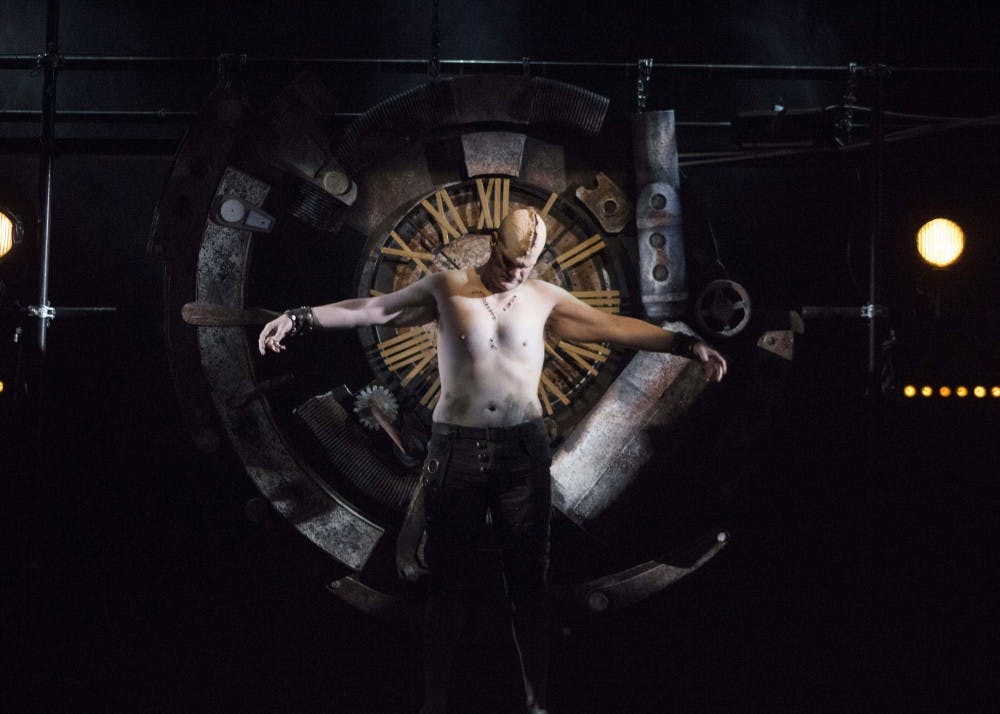“Frankenstein” all began as Mary Shelley's 1818 novel, and 200 years later the Cardinal Stage Company is presenting the classic as a staged production.
The show will premiere Oct. 27 to Nov. 5 at the Buskirk-Chumley Theater. Tickets start at $11.95.
The play follows the story of Victor Frankenstein's creation, the Creature, as it attains consciousness, education and seeks happiness and a place in the world. However, Victor fears the Creature and thwarts his attempts to find acceptance and love. This ultimately leads the Creature on a path for revenge.
“It’s much more the story of a lost soul, or of a person in a lost and fallen world trying to figure out how it is we make ourselves happy,” director Randy White said.
Unlike Shelley’s novel “Frankenstein” and other staged adaptations of the play, this version, written by Nick Dear, focuses on the story of the Creature instead of the scientist who created him. By putting the Creature in the role of the protagonist, the audience sees the reasons and motivations for his behaviors in a more sympathetic light.
“It’s a new perspective of seeing why the Creature is the way he is, rather than accepting, ‘Well, he’s just a creature,’” said Chris Ellis, the actor playing the Creature.
The Creature’s search for companionship lands him with a blind teacher named Delacey, the only person who welcomes and accepts him for who he is. The Creature not only learns how to speak and write from Delacey, but also learns about some of the ethics of human life.
“Delacey teaches him and educates him, and he learns right from wrong, essentially. Or at least the idea of those things,” Ellis said. “You realize he’s not perfect, and he makes horrible mistakes, but you understand him a little more. They may have sympathy for him.”
Shelley, who was a Romantic writer, wrote “Frankenstein” with anxieties about the ethics of scientific progress and how it results in a shift away from the truths of human life, White said. Inspired by a steampunk look, this production explores these topics in Frankenstein’s struggle.
“He runs into machines and working people and the age of Enlightenment that is harsh and brutal, and he stumbles into the woods and finds himself in a romantic, ideal Eden,” White said. “This Romantic Enlightenment argument is literalized in the Creature’s journey on stage.”
The play uses visual effects, projections, grand audio and lighting cues to create a larger-than-life tone while still portraying a believable view of the early 19th century.
“The play sort of sits in period but also feels updated all at the same time,” White said. “It is definitely 1818, 1819, but at the same time, it feels contemporary in the language.”
With a focus on science, technology and progress, Mary Shelley’s novel is often considered the first science-fiction novel.
“If you’re a fan of Star Trek, aliens, a fan of any of the dystopian worlds that we see on television now, this is the progenitor,” White said. “All of science fiction comes out of Mary Shelley’s book. She created it.”
Whether coming for science-fiction, the love of the novel or to see an intriguing and honest human character, it’s a story with a fascinating allegory, White said.
“That push and pull that the Creature undergoes is extremely compelling as you see him make connections and lose connections,” White said.




